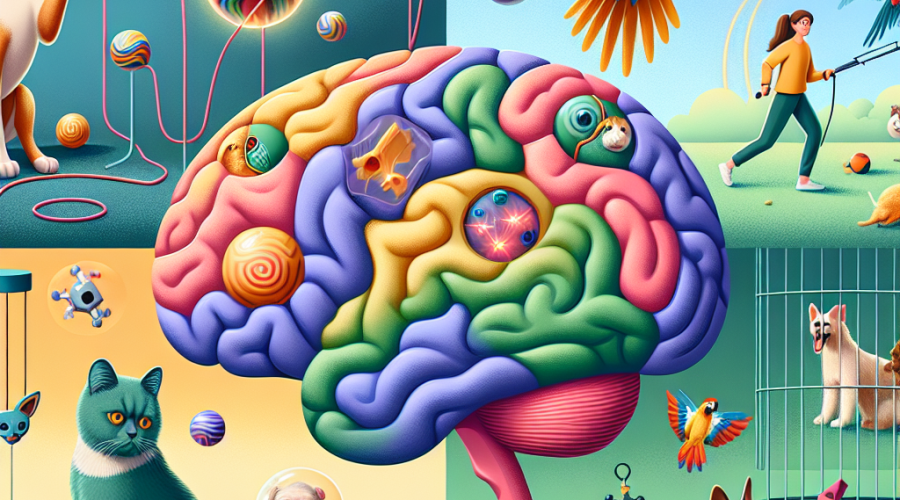Optimal Strategies for Enhancing Your Pet’s Cognitive Health: A Guide to Mental Enrichment and Training Techniques
As doting pet parents, we often fuss over our furry friends’ diets and exercise routines, but how often do we consider their mental fitness? Just like us, our pets need to keep their wits sharp. Cognitive health is pivotal for a pet’s overall wellbeing. So, what exactly are the best strategies for giving your pet’s brain a proper workout?
Think of your pet’s brain as a puzzle that’s never fully solved. Mental enrichment for pets is not just about keeping them busy; it’s about keeping them thinking, learning, and engaging with their environment in new ways. It’s the kind of stimulation that can lead to a happier, more fulfilled, and often better-behaved animal companion. So, let’s dive into the world of mental gymnastics for pets!
First up, let’s talk about the power of play. It’s not just a frivolous activity; it’s a fundamental way to enhance your pet’s cognitive health. Playtime with puzzles or interactive toys can really get those neurons firing. These toys often require pets to solve problems to receive a reward, typically food or a treat. It’s a win-win: your pet gets a tasty snack, and their brain gets a workout.
But it’s not just about the toys. Training sessions are like the brain marathons for pets. Regular training routines, whether it’s basic obedience or complex tricks, can greatly boost your pet’s mental agility. The key here is consistency and patience. Use positive reinforcement techniques to motivate and reward your pet for their mental efforts. You’ll be amazed at how quickly they can learn when their hard work is met with a delicious treat or a cheerful pat.
Have you ever considered that your pet could be the next Picasso? Creative expression isn’t just for humans. Introducing your pets to activities like paw painting or hide-and-seek with toys can stimulate their creativity and cognitive skills. It encourages them to interact with their environment in innovative ways and can also be a fantastic bonding session for you both.
But what about the chatterboxes of the pet world – the birds? Mental enrichment is especially crucial for our feathered friends. Teaching them new words or phrases not only enhances their cognitive abilities but also their social skills. Plus, it’s downright entertaining to have a mini-conversationalist perched in your living room.
Now, let’s not forget the sensory experiences. Have you ever watched a dog sniffing around the park with an air of Sherlock Holmes? That’s because scent work is a brilliant way to engage your pet’s brain. Setting up scent trails or hiding their favourite toy can encourage them to use their most powerful sense to solve the mystery.
For our feline friends, high perches and cat trees can offer a three-dimensional playground to keep their agile minds and bodies fit. Cats love to climb and observe their kingdoms from a height. By providing them with vertical spaces, you’re catering to their natural instincts and giving them a mental edge.
Sometimes, though, it’s about getting back to basics. Simple changes in your pet’s environment can be incredibly stimulating. Rearrange the furniture, introduce new textures or bring in novel objects for them to explore. These changes can be like a breath of fresh air for your pet’s cognitive health, keeping their environment fresh and intriguing.
Let’s not forget the importance of social interaction. Pets, much like humans, need social contact to keep their minds sharp. Arranging playdates with other pets or simply spending quality time with them can do wonders for their mental state. It’s about creating a rich social tapestry that keeps them learning and adapting.
Finally, let’s address diet and supplements. Just as certain foods can sharpen our own cognitive functions, the same goes for our pets. Foods rich in antioxidants, omega-3 fatty acids and vitamins can support brain health. Always consult with your vet before adding supplements to your pet’s diet, though, to ensure they’re suitable for your furry friend.
Enhancing your pet’s cognitive health is all about balance and creativity. Mix up their routine with play, training, sensory experiences, social interactions, and a brain-boosting diet. Remember, a mentally stimulated pet is not only a happier pet but also a healthier one. So, let’s put those paws and claws to work and open up a world of mental enrichment for our beloved animal companions.
FAQs
Q: What are some effective mental enrichment activities for pets?
A: Interactive puzzles and brain games that challenge your pet to solve problems for treats are excellent for mental stimulation. Regularly introducing new toys and changing the environment can also keep your pet mentally engaged.
Q: How does training contribute to a pet’s cognitive health?
A: Consistent training sessions help improve a pet’s memory, responsiveness, and problem-solving skills. Training also strengthens the human-animal bond, providing emotional enrichment that benefits cognitive function.
Q: Can a specific diet enhance my pet’s cognitive health?
A: Yes, diets rich in antioxidants, Omega-3 fatty acids, and certain vitamins, like E and C, can support brain health in pets. Consult with a vet to tailor a diet that’s appropriate for your pet’s cognitive needs.
Q: How much mental stimulation do pets need on a daily basis?
A: The amount of mental stimulation needed varies depending on the pet’s age, breed, and individual temperament, but generally, a combination of daily play, training, and environmental enrichment activities is recommended. It’s essential to observe your pet’s behavior and adjust accordingly to prevent overstimulation or boredom.
Q: What role does social interaction play in my pet’s cognitive health?
A: Social interaction with humans and other animals is crucial for your pet’s mental well-being as it helps to reduce stress, anxiety, and depression while also providing cognitive challenges. Regular playdates, visits to the park, or interactive play at home can significantly contribute to your pet’s social needs.

